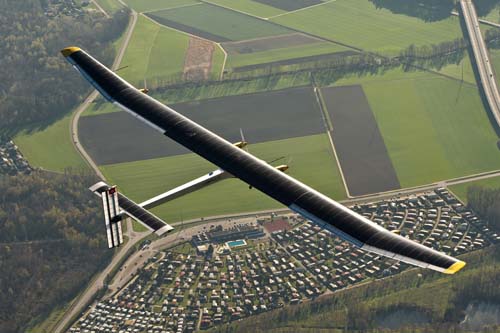University of Arkansas Engineer Contributes to Solar Plane Project

The first Solar Impulse plane, flying over Switzerland. Photo courtesy of Solar Impulse.
Robert Saunders, a graduate of the College of Engineering and an instructor in the electrical engineering department, is designing an autopilot system for a completely solar-powered airplane. This plane, called Solar Impulse, will attempt to fly around the world using nothing but the sun’s energy.
The idea to fly a manned, solar-powered aircraft around the globe began with Bertrand Piccard and Andre Borschberg, both pilots. These two men have been working with the Ecole Polytechnique Federale de Lausanne, or Swiss Institute of Technology, and with a team of mechanical and electrical engineers, physicists, IT specialists, composite material specialists and mission controllers. The team has created the first solar airplane able to fly day and night propelled only by solar energy. They are currently working on a second plane capable of using solar energy to fly around the world.
The wings and horizontal stabilizer of Solar Impulse are covered with solar cells. These cells collect the sun’s energy during the day, which powers the plane and charges the batteries that keep it flying through the night. The first version of the plane, Solar Impulse HB-SIA, holds five world records, including three from its historical 26 hour flight without fuel. A second version, Solar Impulse HB-SIB, is under construction now and is scheduled to attempt a round-the-world flight in 2015. Saunders’ employer, TruTrak, has partnered with Solar Impulse in this endeavor.
Saunders explained that the biggest challenge in creating HB-SIB is ensuring that both the aircraft and the pilot have the endurance for the journey. Since the craft holds only one person, during long flights over oceans and uninhabited areas, the pilot of Solar Impulse will have to fly the plane with only 20-minute breaks for resting. During those 20-minute breaks, Trutrak's auto-pilot system will control the airspeed and direction of the plane.
For most airplanes, controlling altitude is an important task
for the auto-pilot system. On the other hand, Saunders explained that
controlling airspeed is more important for Solar Impulse. “If you go too fast,
you tear the wings off. If you go too slow, you stall. The difference between
the two in this airplane is very small.” In addition, the auto-pilot system
must keep the wings level to control the direction of the plane.
In order for Solar Impulse to complete its flight, the auto-pilot system will have to work perfectly, along with the team at mission control and the single pilot in the cockpit. “It’s a huge endurance test for the pilot,” said Saunders.
On the Solar Impulse website, Piccard explains that “our airplane is not designed to carry passengers, but to carry a message. We want to show what can be achieved using clean technologies to reduce our society’s dependence of fossil energies.”
For more information on Solar Impulse, go to solarimpulse.com.
Contacts
Camilla Medders, director of communications
College of Engineering
(479) 575-5697,
camillam@uark.edu
Headlines
Native American Student Association to Host Annual Choctaw Stickball Tournament
Competition begins at 10 a.m. Saturday the the University Recreation fields on Razorback Road. Carly Keats, a star Razorback basketball player, will play for her home team from Choctaw, Mississippi.
Department of Music Professor to Teach at Italian Festival in June
Richard Rulli, associate professor of trumpet in the Department of Music, has been invited to teach at TrumpetFest June 16-23 in Orvieto, Italy.
Bumpers College Names Senior Scholars, Outstanding Departmental Students
Twenty-five students from 10 different majors and concentrations in Bumpers College were named Senior Scholars for 2023-24, and each department has named its outstanding students for the year.
Music Education Students Bring Fun to Child Development Center
Interactive music sessions known as "music zoos" bring creative learning of musical instruments to the children in the center, as well as providing the music education students the chance to practice their teaching skills.
New Faculty Teaching Portfolio Authors Recognized
The faculty members successfully completed the Teaching Portfolio and will be recognized at the Fall Teaching Awards ceremony hosted by the Cordes Teaching and Faculty Support Center and the Teaching Academy.




